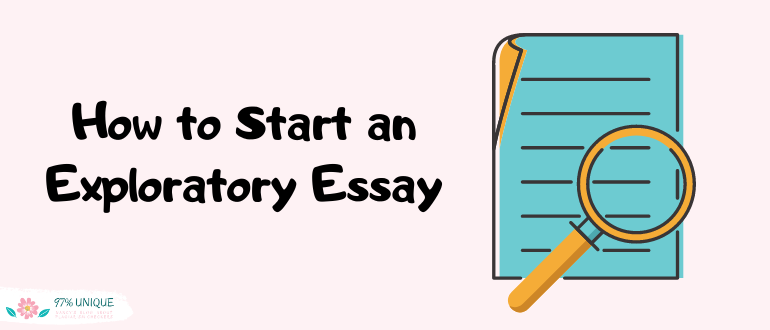
In the past, you’ve probably written essays that were designed to show how much research you’ve done on a topic or to persuade people to come around to a certain point of view.
An exploratory essay is different, and — here’s a secret — it’s actually a lot more fun to write.
I’m a middle school teacher and a former composition instructor to college students, and I can show you how to start an exploratory essay so the rest of it falls into place. This solid foundation will be key to the success of the paper overall.
In addition to my own experience as a writer, I’ve trawled loads of forums and websites so you don’t have to!
When you finish reading this article, you will understand:
- What an exploratory essay is and how it differs from other types of academic papers.
- How to think about the various sides you will present.
- The parts of an exploratory essay.
- How to choose a good topic.
- How to write your thesis statement.
What Is an Exploratory Essay?
In this type of paper, your aim is not to present research or persuade your reader to adopt a certain point of view.
Instead, the aim of this kind of essay is to present the different sides of an issue and explain them. You are, quite literally, “exploring” an important topic and inviting your reader to come along with you on this journey.

Your goal is to fair-mindedly probe and explicate the different viewpoints that people have about the issue.
At the end of the paper, you should have given your reader a lot to think about regarding this issue you’ve chosen to write about, but you shouldn’t have come to a definite conclusion about how to solve the problem.
Ideally, you should have provided additional fodder for discussion.
One way to think about an exploratory essay is as part of a larger ongoing conversation that has the goal of reaching a better understanding in order to solve a problem. With your paper, you should aim to broaden the conversation.

You might also think about an exploratory essay as being similar to a public essay as discussed here.
While you need to observe certain conventions of academic writing in your paper, including citing your sources, an exploratory essay is similar to a public essay in that sense of participating in a conversation that has broad interest.
The key word for this type of paper is “objective.” In other words, you should be presenting the information without taking sides.
It may help you to read some examples of exploratory essays by famous writers.
Why Is Writing an Exploratory Essay Important?
If you read a bunch of news articles about politics and the major issues of today, there’s probably one word you’ll see over and over again, and that word is “polarized.”
In other words, many people have gathered on one “side” or another, and the sides are in exact opposition to one another.
There are a lot of problems with looking at an issue this way. First, it’s very difficult for two polarized sides to ever come to a working solution on an issue when they are this opposed to one another.
Second, this view is usually not really the most accurate one of where people stand on an issue or what the different solutions or ways to look at it are.
The angriest people tend to be on the extreme ends, so you mostly hear from them. But a majority of people tend to be somewhere along a continuum on most issues.
Most successful exploratory essays don’t just look at two sides. A really good one goes beyond the two extremes and examines other points of view.
For example, let’s take a topic like education and public versus private schools.

There are groups of people that have very strong views on this topic.
Some parents are entirely committed to the institution of public education and believe that it is vital to send their children to public schools to support that institution.
Other parents believe that public schools are irretrievably broken and that only private schools can educate their children adequately.
A traditional essay might take one view or the other and argue in favor of it.
However, in an exploratory essay, you would not just look at these two points of views that parents may have.
You might see what teachers, students, administrators, and even employers think. You might also look at other options, such as homeschooling and charter schooling.
An exploratory essay will often present three points of view. This video goes into more detail about how and why you should take this objective approach:
Writing a paper that can go beyond polarized sides and present an issue in a more complex and nuanced way is a vital skill these days in finding solutions to problems.
An exploratory essay will help you step back from thinking about problems in a binary way and realize there may be many different viewpoints, which can be the first step in turning down the temperature of debate and finding solutions.
How Do You Present Other Viewpoints Fairly?
One of the hardest parts about getting ready to write this type of paper is figuring out how you will present viewpoints fairly that you may have strong negative feelings about.
This can result in what is sometimes called a “straw man” version of someone’s argument, meaning that you create an exaggerated or inaccurate version of what they believe.

As you plan this paper and encounter the various points of view, try to read about each argument in a neutral way.
This can be challenging, but it will mean that you write an essay that is more complex and ultimately more successful.
What Are the Parts of an Exploratory Essay?
The simplest version of an essay is the five-paragraph essay. Every paper follows this basic structure whether it is five, 50 or 500 paragraphs long.
All papers start with an introduction that presents the problem. You should also explain why this matters.

For example, maybe you have decided to write about whether private or public schools are better.
This is an important topic because having an educated population enhances the quality of people’s lives and improves the community both economically and socially.
As university instructor Chris Drew, who blogs as “The Helpful Professor,” points out, “sometimes getting started is the hardest part,” and if you are struggling with how to write an exploratory essay, you can wait until later to write your introduction.
Sometimes getting started is the hardest part. Start your #essay on the right foot with these 7 tips: https://t.co/i290DNgqkh. Perfect for procrastinators! #procrastinating #essaytips #writing #studentproblems #studystudystudy #studytips pic.twitter.com/o2zYlfepG1
— Helpful Professor (@helpfulprof) February 17, 2019
If the issue is a complex one and you don’t have the space to thoroughly explore it in your introduction, you should expand on that in the first paragraph or paragraphs of your body, including the background, who is involved in the issue and why it is important.
Next, in the additional body paragraphs, you would explain, explore and develop the different points of view.
As is the case with any paper, you should cite your sources and use quotation marks where appropriate. This article can help remind you of the importance of avoiding plagiarism.
This video can give you additional tips on sources and organization:
Keep in mind that the structure of this type of paper is not as strict as it is for other types.
While it is important to stick to the topic at hand, this kind of paper permits more digressions than other academic writing. Keep the adjective “exploratory” in mind, and follow any interesting pathways through the issue that may crop up while you are writing.
Finally, your conclusion should circle back to the beginning of your essay, restating the main problem and summarizing your points of view.

Some exploratory papers present your own opinion at this point while others do not. If your instructor does not clarify whether they want you to do this, talk to them and find out.
In the conclusion, you may also want to discuss what additional work or research needs to be done to resolve the problem.
How to Start an Exploratory Essay
With all the information about what an exploratory essay is in mind, here are the steps you should take to get started.
Step One: Choosing Your Topic
It is important to choose a topic that has several definite sides and that is relevant in the contemporary world.

The topic should be one that engages you and that you either know something about or are eager to learn about for the purposes of writing the paper.
Step Two: Identifying Your Arguments
Choose three or four arguments to highlight in your paper. You may need to do some research to find out what some of the sides are or how people who take a certain position support that position.
If you have chosen a topic that you personally feel strongly about, you will need to be careful to avoid letting your own feelings about the issue affect your ability to write about it objectively.
One way you can combat this is by thinking about the best possible interpretation you can make of an opponent’s article.
You might find writer Angel Eduardo’s article on “starmanning” helpful.
In case you just heard the excellent conversation between @JohnRWoodJr, @sbkaufman, and @HearAlma on @Clubhouse and are interested in #starmanning, here’s the piece I wrote for @center4inquiry!https://t.co/0na0KXJT1b
— Angel Eduardo (@StrangelEdweird) August 6, 2021
Eduardo’s advice can help you frame opposing arguments fairly: “To star-man is to not only engage with the most charitable version of your opponent’s argument, but also with the most charitable version of your opponent, by acknowledging their good intentions and your shared desires despite your disagreements.”
Another trick I find useful when I write this type of essay is trying to briefly explain the various arguments to a friend and see if they can identify which one I most identify with. If they can’t, then I have succeeded!
Step Three: Your Thesis Statement
Developing a thesis statement for this type of paper is a little bit different from other papers you may have written. Thesis statements usually state a position that you then use the paper to support and develop.
Since you will be neutrally exploring ideas in this paper, you must be careful to develop a thesis statement that is not slanted toward one of the positions that you present.

Instead, it needs to make a reference to the problem and the main positions without making a judgment.
10 Topics For an Exploratory Essay
You could use one of the topics below or tweak them for your own purposes. Or, you might simply find inspiration in these suggestions.
Notice that these are all issues that people feel passionately about and that are relevant in today’s world. They are also issues that have definite sides.
1. Should people eat meat?
2. Is genetic engineering of humans unethical?
3. Should companies do more to stop climate change?
4. How can we reduce the crime rate?
5. Should people reduce their use of social media?
6. Should higher education be free to everyone?
7. Does artificial intelligence present a danger to humanity?
8. Should smoking be outlawed?
9. Should there be limits to “freedom of speech”?
10. Will billionaires investing in space travel benefit humanity?
Useful Resources
- Exploratory essays examples
- The main types of essay
- How to choose your thesis topic
- How to write a strong conclusion for your essay
Conclusion
Some people think an exploratory essay is the most fun kind of essay to write.
However, before you can decide if you agree with them, you need to know how to start an exploratory essay, and the tips above should help.
Choosing a strong topic and finding the right sources, as discussed in this article, are key to getting started.





